Quarantine Read online
Page 3
21
case, when the whole thing is done, I can rank everyone by net worth. I instruct the mod to interrupt me only if it comes across a name I know.
I flop onto my bed, and switch on the room's audio system. The controlling ROM I've been playing lately, 'Paradise' by Angela Renfield, is one of hundreds of thousands of identical copies, but each piece it creates is guaranteed unique. Renfield has set certain parameters for the music, but others are provided by pseudorandom functions, seeded with the date, the time and the audio system's serial number.
Tonight, I seem to have chanced upon an excessive weighting for minimalist influence. After several minutes of nothing but the same (admittedly, impressively resonant) chord, repeated at five-second intervals, I hit the recompose button. The music stops, there's a brief pause, then a new variation begins, a distinct improvement.
I've run 'Paradise' about a hundred times. At first, I could hardly believe that the separate performances had anything in common, but over the months I've begun to apprehend the underlying structure. I see it as resembling a family tree, or a phylogenetic classification of species. The metaphor is imprecise, though; one piece can be judged to be a near or a distant cousin of another, but the concept of ancestry doesn't really translate. I think of the simplest pieces as being primordial, as 'giving rise to' more complex variations, but beyond a certain point it's an arbitrary decision as to who begat, or evolved into, whom.
I've heard some reviewers assert that, after a dozen playings, anyone who is musically literate should fully understand the rules that Renfield has chosen, making further actual performances unbearably redundant. If that's the case, I'm glad of my ignorance. Tonight's second piece is like a brilliant scalpel blade, prising away layer after layer of dead skin. I close my eyes as a trumpet line builds, rising in pitch, then mutates, impossibly, effortlessly, into the liquid sound of metaharps. Flutes
22
join in, with an ornate, mannered theme - but already I think I can discern in it, hidden beneath the fussiness and decoration, hints of a perfect silver needle which will recur in a hundred guises; which will be honed, muted, then honed again; which will be held up for my admiration, one last time, then plunged into my heart.
Suddenly, four lines of glowing text appear at the bottom of my visual field:
[Backroom Worker:
Natural memory association.
Casey, Joseph Patrick.
Head of Security as of 12th June, 2066.]
I'd forgotten that I'd asked for staff records, too - or I would have excluded them. I think about waiting for the music to finish, but there's no point; I know full well that I'd be unable to enjoy it. I hit the stop button, and one more unique incarnation of 'Paradise' disappears forever.
Casey is five years older than me, so his retirement, shortly after mine, was not so premature. He's sitting in a corner of the crowded bar, drinking beer, and I join him in the ritual. I suppose it's a strange way to pass the time, when not a microgram of ethanol will make it into either of our bloodstreams - while mods compute our consumption and deliver a purely neural buzz in lieu of the (insanely toxic) real thing - but then, if this cultural fossil lasted a thousand years and endured beyond all memory of its origins, it would hardly be unique in doing so.
'We never see you, Nick. Where have you been hiding?'
We? It takes me a moment to register that he means, not himself and his absent wife, but the bar full of cops and ex-cops; the 'law-enforcement community', as the politicians would say - the way they used to talk about the Chinese or Italian or Greek community - as if the neural and physical modifications we share made us into some
23
kind of homogeneous demographic target. I glance around the room and find, mercifully, that I recognize almost nobody.
'You know how it is.'
'Business is good?'
'I'm making a living. You were with RehabCorp, last I heard. What happened?' 'IS bought them out.'
'Yeah, I remember that. Lots of retrenchments.'
Ί was lucky. I had connections, I got myself moved sideways. There were people who'd been with RehabCorp for thirty years who got dumped.'
'So what's it like at the Hilgemann?'
He laughs. 'What do you think? Anyone who ends up in a place like that - anyone they can't fix with a mod, these days - has to be a complete fucking zombie. Security is not a problem.'
'No? What about Laura Andrews?'
'You're in on that?' He's no more surprised than politeness requires; Cheng would have had him clear me, before she even returned my call.
'Yeah.'
'Who for?'
'Who do you think?'
'Fucked if I know. Not for the sister; Winters is working for the sister. Mind you, Winters' job isn't finding Laura Andrews; her job is to make me look like shit. That bitch is probably spending all her time sitting at a computer somewhere, fabricating evidence.'
'Probably.' Not for the sister. Who, then? A relative of another patient? Someone who believes they'd be shelling out ransom money right now, if the kidnapping hadn't been botched - and who wants to make sure that there isn't a second, successful attempt?
'The case is a joke, you know. We weren't negligent. Remember that guy who sued the owners of the Sydney Hilton when his daughter got kidnapped from one of their rooms? He was pulverized. The same thing will happen here.'
24
'Maybe.'
He laughs sourly. 'You don't give a shit either way, do you?'
'No. And neither should you. IS won't sack you, even if they lose the case. They're not idiots; they allocate a certain budget for security, enough to keep the patients in. If they wanted some kind of fortress, they know they'd have to pay for it. They've been running prisons long enough to understand the costs.'
He hesitates, then says,' "Enough to keep the patients in?" Yeah? Laura Andrews got out twice before.' He glares at me. 'And if that ever reaches the sister, I'll break your fucking neck.'
I stare at him, grinning sceptically, waiting for the joke to be made clear. He just stares back glumly. I say, 'What do you mean, she "got out"? How?'
How? Shit! I don't know how. If I knew how, then she wouldn't have been allowed to do it again, would she?'
'But ... I thought she couldn't even turn a door handle.'
'That's what the doctors say. Well, nobody's seen her turn a fucking door handle. Nobody's seen her do anything smart enough to shame a cockroach. But anyone who can get past locked doors, and cameras, and movement sensors, three times, isn't what she appears to be, is she?'
I snort. 'What are you getting at? You think she's been shamming total imbecility for more than thirty years? She never even learnt to speak! You think she started faking brain damage when she was twelve months old?'
He shrugs. 'Who knows about thirty years ago? The records say one thing, but I wasn't there. All I know is what she's done in the last eighteen months. How would you explain it?'
'Maybe she's an idiote savante. Or an idiot escapologist.' Casey rolls his eyes. 'Okay. I have no idea. But. . . what happened? The first two times? How far did she get?'
'Into the grounds, the first time. A couple of kilometres away, the second. We found her in the morning, just
25
wandering about, with the same bland dumb innocent expression on her face as always. I wanted to put a camera inside her room, but the Hilgemann wasn't having that -some UN convention on the Rights of the Mentally III. IS got enough flak over that Texan prison thing that they're ultra-careful now.' He laughs. 'And how could I argue that I needed more hardware? The patients are vegetables. The rooms have one door and one window; both are monitored twenty-four hours - how could I justify anything more? I mean, I couldn't say to the fucking Director, "If you're such a genius, you tell me how she does it. You tell me how to stop her." '
I shake my head. 'She didn't do any of this. She can't have. Somebody took her. All three times.'
'Yeah? Who? Why? What
do you call the first two times - dry runs?'
I hesitate. 'Disinformation? Someone trying to convince you that she could break out on her own, so that when they finally took her, you'd think -' Casey is miming severe incredulity, verging on physical pain. I say, 'Okay. It sounds like a load of crap to me, too. But I can't believe she just walked out of there, alone.'
It takes me forever to get to sleep. Boss (Human Dignity, $999) may have rendered it a matter of conscious choice, but somehow I still manage to be an insomniac; I always have some reason to delay the decision, I always have some problem I want to think through - as if every last nagging question which once might have kept me awake had to be dealt with in the old way, regardless.
Or maybe I'm just developing what they call Zeno's Lethargy. Now that so many aspects of life are subject to nothing but choice, people's brains are seizing up. Now that there's so much to be had, literally merely by wanting it, people are building new layers into their thought processes, to protect them from all this power and freedom; near-endless regressions of wanting to decide to want to decide to want to decide what the fuck it is they really do want.
26
What I want, right now, is to understand the Andrews case, but there's no mod in my head which can grant me that.
Karen says, 'Okay. So you have no idea why Laura was kidnapped. Fine. Stick to the facts. Wherever she's been taken, someone must have seen her along the way. Forget about motives for now - just find out where she is.'
I nod. 'You're right. As always. I'll put an ad in the news systems -'
'In the morning.'
I laugh. 'Yes, okay, in the morning.'
With her familiar warmth beside me, I close my eyes.
'Nick?'
'Yes?'
She kisses me lightly. 'Dream about me.' I do.
27
2
'Hallelujah! I can see them! / can see the starsΓ
I turn, startled, to see a young woman on her knees in the middle of the crowded street, arms outstretched, gazing ecstatically into the dazzling blue sky. For a moment, she seems to be frozen - transfixed, enraptured - then she screams again, Ί can see them! I can see themP and starts pounding her ribs, rocking back and forth on her knees, gasping and sobbing.
But that cult died out twenty years ago.
The woman shrieks and twitches. Two embarrassed friends stand beside her, while the traffic smoothly detours around the scene. I watch with mounting dismay, as childhood memories of ranting, convulsing street mystics start flooding back.
'All the beautiful stars! AH the glorious constellations! Scorpius! Libra! Centaurus!' Tears stream down her face.
I fight down a sense of panic and revulsion that's growing out of all proportion. This is just one woman, just one freak. The very fact that she's such a spectacle only proves what a rarity this is, proves that most people have adapted, have accepted The Bubble and moved on. What am I afraid of? That every last form of Bubble hysteria, every last obscure religious sect, every last bizarre mass psychosis, is destined to be revived?
As I turn away, the woman's companions suddenly burst out laughing. A moment later, she joins them - and belatedly, I think I understand. Astral Sphere is back in fashion, that's all. A planetarium in the skull. A gimmick, not an epiphany. I've read the reviews; the mod offers a variety of settings, ranging from a realistic view of the stars 'exactly as they would be' - complete with accurate diurnal and seasonal motions, masking by clouds and buildings, and convincing fade-ins at dusk and fade-outs
28
at dawn - through to the dissolution of all obstacles (the sunlit atmosphere and the Earth beneath your feet included), and the option of moving the point of view millennia into the past or the future, or half-way across the galaxy.
The trio are falling in and out of each other's arms now, laughing. The cult is being mocked, not revived; these teenagers must have seen it portrayed in some old documentary. I walk on, feeling slightly foolish - and greatly relieved.
When I reach my building, I take the stairs slowly, reluctant to face an empty calls log, again. I've had ads in all the news systems for four days running, and they've yet to attract even a hoax call. The New Year should have helped; news-system readership increases on public holidays, when people have nothing better to do. Maybe ten thousand dollars isn't a large enough reward, but I doubt that my client would appreciate me doubling it. Not that I'm any closer to knowing who my client is. The Hilgemann's patient records listed no one with family ties to spectacular wealth or fame - and in retrospect, I'm not surprised. The very rich would, at the very least, take care that the records were meticulously falsified, and the obscenely wealthy would keep their demented relatives right out of harm's way, in soundproof wings of their own impenetrable mansions. I'm tempted to dig deeper, but I won't. I may suffer the (purely aesthetic) urge to incorporate my client into the Big Picture, but as yet I have no good reason to believe that it would help me find Laura.
No calls.
I resist punching the sofa; the upholstery has already split to the point where further damage yields diminishing satisfaction. It's getting close to the deadline for lodging the ad for one more day; I display the copy on my terminal and stare at it glumly, wondering if there's anything I could change that would make a difference, short of adding a zero or two to the reward. I've used a picture of Laura straight from the Hilgemann's patient records; it closely matches my own received mental image,
29
suggesting that my client's knowledge of Laura's appearance was based on the very same shot. Her face is distinctive, but who knows what she looks like by now? No need for plastic surgery; a good synthetic-skin mask is all that's required.
I lodge the ad again, for what it's worth. If Laura was taken by accident, she'd be long dead by now - and I doubt that I'd ever find the body, let alone the people responsible. My only real hope is that, not only did her kidnappers have some obscure reason for deliberately abducting her, but whatever it was, it required them to do something riskier than merely locking her up, or slaughtering her.
Like smuggling her out of the country.
Getting Laura onto a plane would not be difficult. Her imbecility would be almost as easy to conceal as her face; there are dozens of illegal mods which could transform her into the walking puppet of a travelling companion, or even a semi-autonomous 'robot', capable of such rudimentary tasks as laughing and crying at all the right moments during the in-flight movie.
Faking an exit-visa record in the Foreign Affairs database is no big deal. It would vanish an hour or two later, and the airline's files would also be appropriately amended. Foreign Affairs, Customs and the airlines are all being screwed blind, twenty-four hours a day, by a hundred different hackers - and, ironically, that's what makes it possible, if you're lucky, to trace an illegal traveller. Hackers may run rings around the target systems' own archaic security, but they can't avoid making their presence known to each other. In the process of capturing data essential for their own work, they can't help capturing details of other violations in progress. Like all information, this is for sale.
Bella is acting as a broker for me, as well as providing some data of her own. I call her and download another batch. The relevance of any one heap of raw data is a matter of luck; the more you buy, the better the odds, but there's no guarantee of success when the event you're
30
trying to trace took place (if at all) at an unknown airport, at an unknown time in the last five weeks.
Finding the fake exit visas is easy; the very fact that they have to be wiped to avoid (sluggish) official scrutiny betrays their existence in any time series of illicit snapshots of the database. The problem is finding Laura in the crowd; there are over one hundred illegal exits per week, nationwide. From the Hilgemann, I have her DNA signature, fingerprints, retinal patterns and skeletal measurements. DNA isn't used by Customs (there are too many complications, legal and cultural, in sampling international travellers en m
asse), but the other three are always checked, and must match for pre-departure clearance. After that, though, the common practice is to change these details in the fake visa record, precisely to make things harder for people like me. Although the record itself must persist for the duration of the flight, with the name and photo unchanged (to avoid triggering various anti-terrorist checks carried out by the airlines), the biological ID data isn't accessed again until the passenger goes through Customs at their destination. So, there are only two brief periods when the visa record needs to contain anything truthful; in theory, these times could be measured in milliseconds, but in practice things can't be tuned that finely, and the windows have to be several minutes long. However, fingerprints and retinal patterns are relatively easy to alter by nanosurgery, leaving only the bone lengths to be trusted. They can be modified too, if you're desperate, but nobody walks onto a plane straight after that kind of reconstruction, puppet or not - and travelling as an obvious invalid would be like carrying a sign around your neck.
I analyse the latest series of snapshots; in no time at all they prove as worthless as the rest.
I flip idly through the gigabytes of junk that I've accumulated, flight after flight from the country's ten international airports, everything from menus to seating plans to. . . cargo manifests. Of course, Laura could have been sent as cargo, but it wouldn't have been a very smart
31
choice. All cargo is either X-rayed or manually inspected, so there's only one kind of cargo that a human being can mimic: a human corpse. Achieving the resemblance would be no problem; drugs which shut down the metabolism for a couple of hours, without damage to the brain or any other organ, have been available for decades. What makes the method unattractive is the signal-to-noise ratio; the sheer number of illegal live passengers is itself a kind of camouflage, but only one or two corpses are flown out of the country each week.

 Zendegi
Zendegi Permutation City
Permutation City The Eternal Flame
The Eternal Flame Artifacts
Artifacts Wang's Carpets
Wang's Carpets Dichronauts
Dichronauts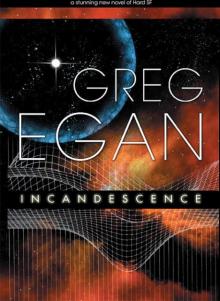 Incandescence
Incandescence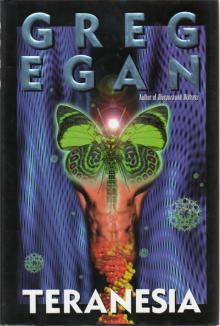 Teranesia
Teranesia Schild's Ladder
Schild's Ladder Quarantine
Quarantine The Four Thousand, the Eight Hundred
The Four Thousand, the Eight Hundred The Clockwork Rocket
The Clockwork Rocket Zeitgeber
Zeitgeber Phoresis
Phoresis The Nearest
The Nearest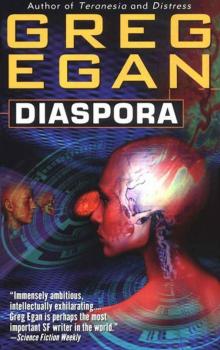 Diaspora
Diaspora Instantiation
Instantiation Distress
Distress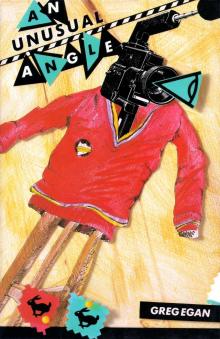 An Unusual Angle
An Unusual Angle Oceanic
Oceanic The Arrows of Time
The Arrows of Time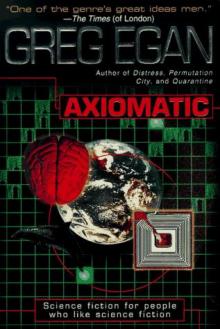 Axiomatic
Axiomatic![Anthology 2. Luminous [1998, 2010] Read online](http://i1.bookreadfree.com/i/03/18/anthology_2_luminous_1998_2010_preview.jpg) Anthology 2. Luminous [1998, 2010]
Anthology 2. Luminous [1998, 2010] Perihelion Summer
Perihelion Summer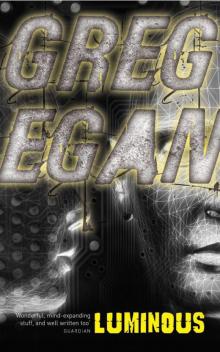 Luminous
Luminous